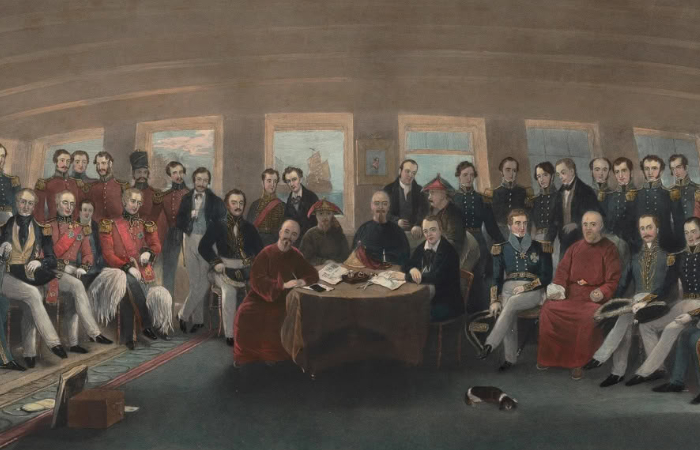The backdrop: the First Opium War and its origins
In the early 19th century, the British Empire faced a trade imbalance with China, primarily due to its high demand for Chinese tea, silk, and porcelain. To counteract this, Britain began exporting opium from India to China, leading to widespread addiction and social issues within Chinese society. The Qing dynasty’s attempts to suppress the opium trade, including the confiscation and destruction of opium stocks by Commissioner Lin Zexu in 1839, escalated tensions, culminating in the First Opium War (1839–1842).
The Treaty of Nanjing: terms and stipulations
Signed on August 29, 1842, aboard the HMS Cornwallis, the Treaty of Nanjing marked the end of the First Opium War. The treaty imposed several significant terms on China:
- Cession of Hong Kong: China ceded Hong Kong Island to Britain, establishing a strategic colonial foothold.
- Opening of ports: Five ports—Canton (Guangzhou), Amoy (Xiamen), Foochow (Fuzhou), Ningpo (Ningbo), and Shanghai—were opened to British trade and residence.
- Indemnity payments: China agreed to pay £6 million for the destroyed opium, £3 million for debts owed to British merchants, and £12 million for war reparations, totaling £21 million.
- Abolition of the Cohong monopoly: The treaty dismantled the Cohong system, allowing British merchants to trade freely with any Chinese merchants.
- Fixed tariffs: China agreed to establish a «fair and reasonable» tariff, limiting its ability to control foreign trade.
The concept of «unequal treaties»
The Treaty of Nanjing is often referred to as the first of the «unequal treaties» imposed on China by Western powers. These treaties were characterized by their imposition through military force and their infringement on China’s sovereignty. The term reflects the power imbalance and the lack of mutual agreement in the treaty’s formation.
Impact on China’s sovereignty and legal system
The treaty significantly undermined China’s sovereignty:
- Extraterritoriality: British citizens in China were granted immunity from Chinese law, subject instead to British legal jurisdiction.
- Loss of tariff autonomy: By agreeing to fixed tariffs, China lost control over its own trade policies, affecting its economic independence.
- Precedent for other powers: The treaty set a precedent, leading other Western nations to seek similar concessions, further eroding China’s autonomy.
Economic and social consequences
The treaty’s economic implications were profound:
- Financial strain: The indemnity payments placed a heavy burden on China’s treasury, leading to increased taxation and public discontent.
- Trade imbalance: The opening of ports and fixed tariffs favored British merchants, leading to an influx of foreign goods and a decline in local industries.
- Opium trade continuation: Despite the war’s origins, the treaty did not address the opium trade, which continued to have detrimental effects on Chinese society.
Long-term implications and legacy
The Treaty of Nanjing had lasting effects on China’s trajectory:
- Colonial foothold: The cession of Hong Kong became a symbol of foreign domination, remaining under British control until 1997.
- Erosion of sovereignty: Subsequent treaties with other Western powers further diminished China’s control over its territory and legal system.
- Catalyst for reform: The national humiliation experienced due to the treaty spurred internal debates and movements aimed at strengthening and modernizing China.
Conclusion
The Treaty of Nanjing in 1842 was a watershed moment in Chinese history, marking the beginning of a period characterized by foreign intervention and internal challenges. Its terms not only ended the First Opium War but also set the stage for a century of significant transformations in China’s political, economic, and social structures.
